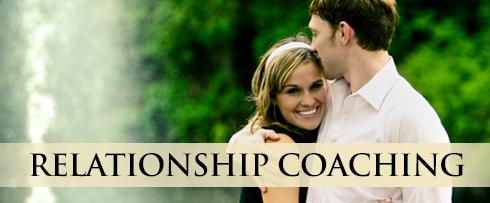 Relationship Coaching is the application of professional coaching to personal and business relationships.
Relationship Coaching is the application of professional coaching to personal and business relationships.
While many singles and couples become motivated to seek help when struggling with their relationships, coaching and relationship coaching are positive, results-oriented professions that help functional people achieve their personal and relationship goals and is not a substitute or replacement for therapy provided by a licensed clinician trained to treat mental, emotional, and psychological disorders.
While relationship coaches might be experts in relationships, the art and science of coaching is to facilitate success from inside the client without providing advice or “professional opinions.”
Relationship Coaching addresses one of humanity’s most basic needs; for love and connection. As social beings it is almost impossible for us to be successful or fulfilled without supportive, successful relationships.
Relationship Coaching Specialties
Singles Coaching
44% of U.S. adults are single, and 27% of adults live alone. (Source- census.gov) If this trend continues, soon, the majority of the population of the western world will be single.
Helping singles have fulfilling lives and successful relationships requires understanding that not all singles are alike and most do not fit the stereotype of being lonely and desperate for a relationship.
The Relationship Coaching Institute identifies the following seven types of singles:
- Temporarily Single-actively seeking a partner and in between relationships
- Recently Divorced/Widowed-recovering from loss and not ready for a relationship
- Frustrated Single-wants a partner, not able to find one and gives up
- Passive Single- wants a relationship but not actively seeking a partner
- Single But Not Available- self-perception of being single and desires a lasting relationship, but “hooking up” to get needs met
- Busy/Distracted Single-absorbed in being a single parent, career, school, etc. and doesn’t have time or desire for partner
- Single by Choice- no desire for a partner, being single is a conscious permanent lifestyle choice for many reasons, including-
- “Been there, done that, don’t want to do it again”
- “Why buy the cow when you can get the milk for free?”
- Ascetic or other religious/spiritual reason
- Loner
- Values independence more than couplehood
- Polyamory/alternative lifestyle that doesn’t lend itself to cohabitation
- Celibate/asexual
- Financial reasons
- Aging
- Health
Each type of single has their own unique developmental goals and challenges requiring specialized skills and strategies to effectively coach them to experience relationship success independent of the advice-driven approaches of other professions.
Couples Coaching
As with singles, not all couples are alike. Relationship Coaching Institute identifies the following four types of couples:
- Dating Couples: Self identify as “single” but have an on-going, non-exclusive relationship. “Friends with benefits” is one common way of describing these couples. These couples see the purpose of their relationship as fun and recreational. Dating couples often seek coaching when one or both partners want to take their relationship to the next level.
- Pre-committed Couples: Both partners have decided to stop dating others and become an exclusive couple, and while co-habitation is common at this stage, no formal or explicit long-term commitments have been made. These couples often desire commitment and are testing their relationship for long-term compatibility. Pre-committed couples often seek coaching when they encounter a “deal-breaker” (referred to by Relationship Coaching Institute as a “requirement”) preventing their ability to enter into a long-term committed relationship without sacrificing something important (such as whether or not to have children).
- Pre-marital Couples: Both partners have decided to become committed, but haven’t yet acted to formalize their commitment (marriage, commitment ceremony, etc.). Many of these couples are acutely aware of the high failure rate of committed relationships and seek coaching to acquire the skills and practices needed for long-term relationship success.
- Committed Couples: “Commitment” can be defined as both an “attitude” (belief) and a “fact” (formal, symbolic, even legal act). While most couples might think of their relationship as “committed,” if they haven’t acted to formalize their commitment they have the attitude but not the fact of commitment. Couples who have made a formal commitment sometimes bring up divorce in response to a problem, which can be a cause of confusion, consternation and conflict. Most committed couples are married or have formalized their commitment in a ceremony of some kind. These couples often seek coaching because they desire to find a way to successfully solve problems and “live happily ever after.”
Family Coaching
Family coaching includes nuclear and extended families, parenting, siblings, family businesses and co-housing arrangements.
Business Relationship Coaching
Productive businesses require effective relationships. Coaching business relationships can include workplace relationships such as manager-employee, peer-peer, between corporate divisions, teams, as well as customer and vendor relationships.
Comparing Coaching and Therapy
Relationship coaching is a professional client-focused service where an individual or couple is assumed to be healthy, powerful, and able to achieve relationship goals with effective support, information, and guidance. There are significant and sometimes contrasting differences between therapy and coaching, and these differences in and of themselves better highlight the strengths of coaching.
In short, coaching is a results and goal-oriented methodology that assumes the client is functional and fully capable of success, while (psycho)therapy is a healing profession trained and licensed to diagnose and treat mental, emotional, and psychological disorders. Coaching and therapy can complement each other very well. It could be said that coaching starts where therapy ends, making coaching a good fit for personal growth-oriented therapists.
View our team of professional IMH Certified Relationship Coaches by clicking this link.
If you are interested to train and become a professional and Certified Relationship Coach (CRC) so that you will have the knowledge, skills and confidence to coach and guide singles and couples to achieve their relationship goals through relationship enrichment and better life and relationship management, then please click the link below for entry requirements and course details about our:
